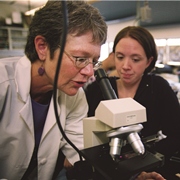A team of professors at the University of Maine at Presque Isle has been awarded a $91,875 Maine Economic Improvement Fund Small Campus Initiative grant from the University of Maine System that will allow them to focus efforts on preparing students for emerging trends and careers in the biomedical research and healthcare industries.
The overarching goal of the project, titled Developing Maine’s Future Biomedical Work Force, is to increase the supply of qualified graduates for biotechnology sector employment in the state of Maine. The UMPI team leading this effort includes Dr. Scott Dobrin, Dr. Rachael Hannah, and Dr. Judith Roe, all Assistant Professors of Biology; and Dr. Linda Graves, Co-Director of the Medical Laboratory Technology [MLT] Program of Maine.
In awarding the grant, reviewers commented that the project “will provide excellent training for students in real research experiences.”
The UMPI team expects the project to result in increased job placement for UMPI graduates, more experiential learning courses that allow students to develop critical thinking skills, a greater number of UMPI students attending graduate school programs in biotechnology related fields, and a much more tech savvy workforce that may open new opportunities for the local economy.
“This grant award is a testament that UMPI is doing things right, and it will provide significant support for our work in biology and the health sciences,” Provost and Academic Vice President Michael Sonntag said. “Across all academic programs, we’ve focused on raising our research profile and hiring faculty with the expectation they will seek grant support for their work, all with an eye toward providing students with the best possible experiences. Students are rightly concerned about future employment, and student research, internships, and other experiential learning opportunities show future employers and graduate schools that our students are well prepared.”
The project, which aligns with the State of Maine’s science and technology plans, involves a three-pronged approach to maximizing student success in pursuing emerging careers in the health and biomedical fields: faculty will increase experiential learning experiences in the MLT program, develop a new hands-on biotechnology course, and provide students the opportunity to participate in faculty research projects.
Within the MLT program, the grant will cover the purchase of new equipment that will allow instructors to maximize their lab time and provide students with more specific feedback on how to fine tune their microscope skills. This includes two new phlebotomy training devices and updated microscopes—a digital microscope for large group training and a dual-head microscope for one-on-one training.
The new biotechnology course that will be created through the grant will center on experiential learning. As part of the course, students will design and perform experiments using modern biotechnology tools commonly found in medical and research laboratories, such as a fluorescent capable microscope and related software, a microinjection system, and a shaking incubator. The class will be developed over the course of the next year and is expected to run in Spring 2014.
The grant also will allow faculty to increase student research participation by 40 percent during the next year. Undergraduate researchers will work with Dr. Dobrin to examine the sub-lethal effects of pesticides on honey bee learning, with Dr. Hannah on neuronal regeneration and recovery following traumatic brain injury in zebrafish, and with Dr. Roe on genetic regulation of plants and aquatic invertebrates in response to temperature and climate change. New equipment that will allow for students’ research participation includes an insect emergence incubator, a plant growth chamber, temperature recorders, and components used in assaying visual learning of honey bees.
The grant project is expected to have many other positive outcomes, including allowing the UMPI team to establish community contacts for internships in the biotechnology sector and to spend more time in scientific fields like Bioinformatics, which has been identified as an international and national priority.
“We are excited for the opportunities the funds will provide UMPI students in developing as scientists, health care professionals, and the leaders of tomorrow,” Dr. Dobrin said. “Through this project, local and regional students will now be better prepared to serve the needs of their home communities.”
The Maine Economic Improvement Fund was established in 1997 to support the expansion of the long-established research mission of the University of Maine. MEIF targets seven key areas of economic importance and potential: aquaculture and marine sciences; biotechnology; composites and advanced materials technologies; environmental technologies; information technologies; advanced technologies for agriculture and forestry; and precision manufacturing.
To learn more about UMPI’s Biology and MLT programs, please contact the University at 207-768-9532.
